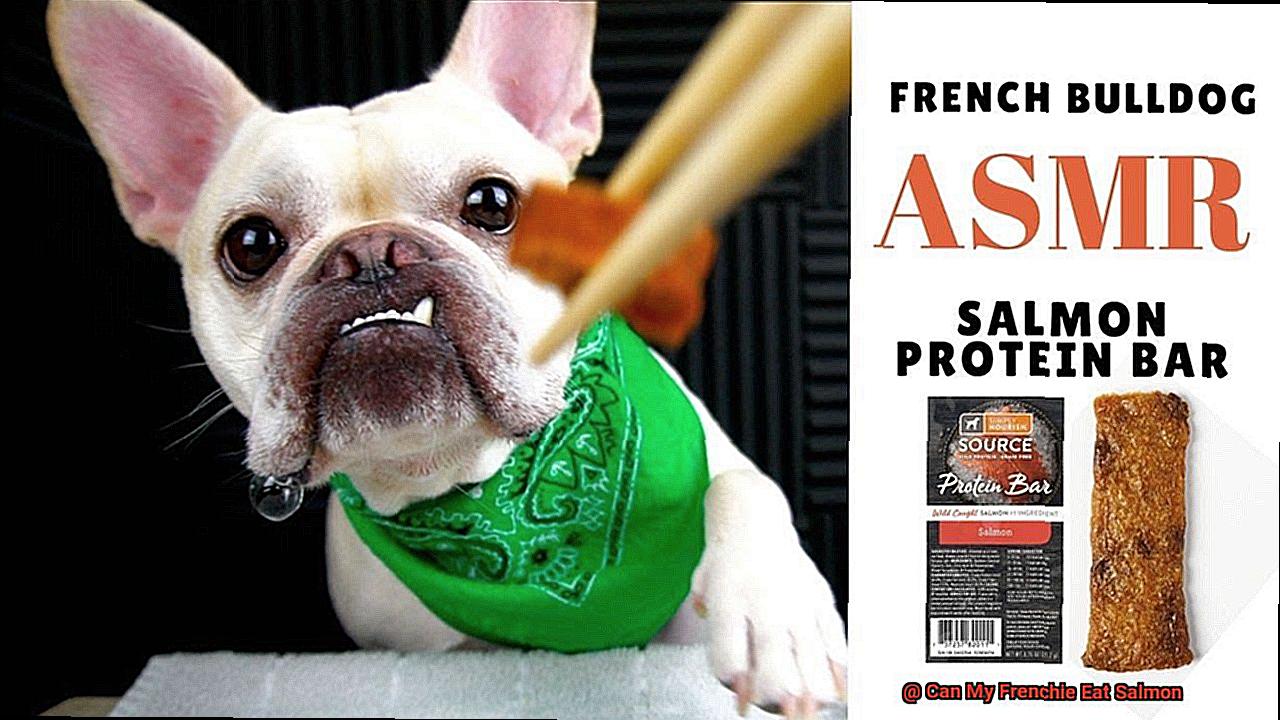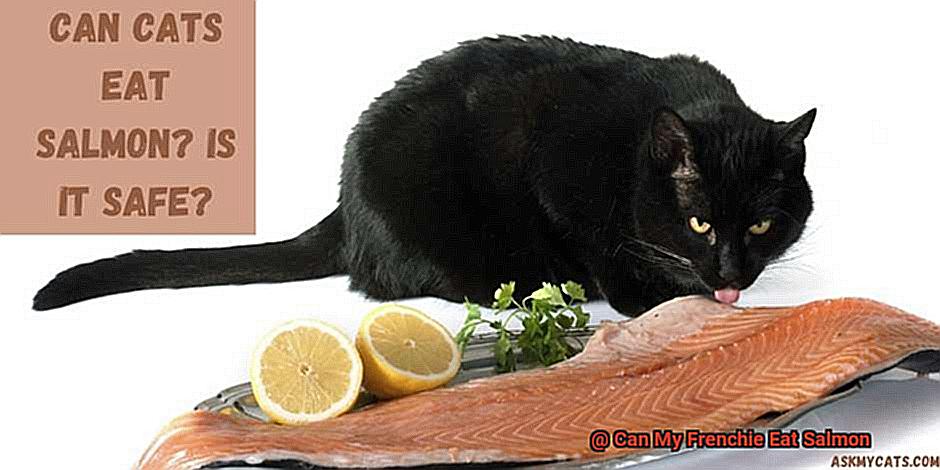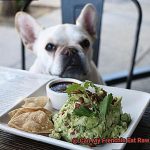Can My Frenchie Eat Salmon?
As proud owners of French Bulldogs, it’s our duty to make sure they chow down on a balanced and nutritious diet. But hey, what about salmon? You know, that fish people rave about for its health perks? Can our four-legged pals safely indulge in this aquatic delight? Well, hold onto your leashes because we’re diving deep into the world of salmon and Frenchies. We’ll uncover the potential risks and rewards lurking behind this tantalizing question. So buckle up, folks, as we embark on an informative journey to unveil whether or not salmon is a friend or foe for our beloved French Bulldogs.
Is Salmon Safe for French Bulldogs to Eat?
Contents
- 1 Is Salmon Safe for French Bulldogs to Eat?
- 2 How to Prepare Salmon for Your Frenchie
- 3 The Dos and Don’ts of Feeding Your Frenchie Salmon
- 4 Potential Health Risks of Feeding Your Frenchie Salmon
- 5 How Much Salmon Should I Give My Frenchie?
- 6 Tips for Incorporating Salmon into Your Frenchie’s Diet
- 7 Alternatives to Salmon for French Bulldogs
- 8 Conclusion
French Bulldogs are adorable little bundles of joy, and as a Frenchie owner myself, I understand the importance of providing them with a healthy and balanced diet. One common question that many Frenchie owners have is whether it’s safe for their furry friends to eat salmon. Well, I’m here to shed some light on the subject and give you the scoop on salmon for French Bulldogs.
Salmon is a type of fish that is packed with nutrients and omega-3 fatty acids, which can be beneficial for your Frenchie’s skin, coat, and overall health. However, there are a few important considerations that you need to keep in mind before serving up a tasty salmon treat for your Frenchie.
- Raw vs. Cooked Salmon: Raw salmon may contain parasites or bacteria that can be harmful to dogs. It’s best to play it safe and feed your Frenchie cooked salmon instead. Grilling, baking, or steaming the salmon will ensure that it’s safe and delicious for your furry friend.
- Skin and Bones: While the flesh of salmon is safe for French Bulldogs to eat, the skin and bones are not. The skin can be high in fat and may cause tummy troubles or even pancreatitis in dogs if consumed in large quantities. Additionally, bones can pose a choking hazard or cause internal injuries if swallowed. So be sure to remove the skin and bones before serving up some scrumptious salmon to your Frenchie.
- Seasonings and Additives: When preparing salmon for your Frenchie, it’s important to keep it plain and simple. Many seasonings and additives that we humans enjoy can be toxic to dogs. So avoid adding any salt, garlic, onions, or spices to the salmon. Plain, unseasoned cooked salmon is the way to go for your Frenchie’s safety and well-being.
- Moderation is Key: While salmon can provide valuable nutrients for your Frenchie, it should only be given in moderation as part of a balanced diet. Too much salmon can lead to an imbalance in essential nutrients, so consult with your veterinarian to determine the appropriate amount of salmon for your Frenchie based on their specific needs and health conditions.
- Allergic Reactions: Just like humans, dogs can have allergies too. Some French Bulldogs may be allergic or sensitive to certain types of fish, including salmon. Keep an eye out for any signs of an allergic reaction, such as itching, vomiting, diarrhea, or difficulty breathing. If you notice any adverse reactions, it’s best to discontinue feeding your Frenchie salmon and consult with your veterinarian for further guidance.
How to Prepare Salmon for Your Frenchie
Salmon is a delicious and nutrient-packed fish that many of us enjoy. But can our furry friends, like French Bulldogs, also indulge in this tasty treat? The answer is yes, but there are some essential steps to follow to ensure your Frenchie’s safety and enjoyment. In this guide, we will explore how to safely prepare salmon for your Frenchie, from choosing the right fish to cooking it to perfection.
The Importance of Freshness:
When it comes to salmon, freshness is key. Just like us, dogs deserve the best quality ingredients. Look for fresh salmon with no strong odor or slimy texture. Opt for wild-caught salmon, as it tends to be less contaminated with toxins compared to farm-raised salmon.
Removing the Bones:
While salmon is packed with nutrients, its bones can pose a choking hazard for your Frenchie. Before feeding it to your pup, carefully remove any bones from the fillets. This simple step will ensure their safety during mealtime.
Cook It Thoroughly:
Raw or undercooked fish can contain harmful bacteria and parasites that can make your Frenchie sick. To avoid any health risks, cook the salmon until it is fully cooked and flakes easily with a fork. Baking, grilling, or steaming are great cooking methods to achieve this.
Seasoning Tips:
When preparing the salmon for your Frenchie, keep in mind that some seasonings and ingredients can be toxic to dogs. Avoid adding onions, garlic, or excessive amounts of salt. Stick to plain, unseasoned salmon to ensure your pup’s safety.
Cooling and Serving:
After cooking the salmon, allow it to cool before serving it to your Frenchie. Hot food can burn their mouth and throat. You can cut the cooked salmon into small, bite-sized pieces or shred it into smaller portions for easier consumption.
The Dos and Don’ts of Feeding Your Frenchie Salmon
French Bulldogs are adorable little companions that bring so much joy to our lives. As responsible pet owners, it’s crucial to understand what foods are safe for our furry friends to consume.
While salmon can be a nutritious addition to a dog’s diet, there are certain precautions to take. In this guide, we will explore the dos and don’ts of feeding your Frenchie salmon, ensuring their health and happiness.
Do: Choose Fresh, High-Quality Salmon
When it comes to feeding your Frenchie salmon, fresh is best. Opt for high-quality salmon that is free from additives or preservatives. Fresh salmon not only provides essential nutrients but also helps avoid any potential bacterial contamination. Additionally, consider choosing wild-caught salmon over farm-raised salmon, as it tends to have fewer toxins and higher omega-3 fatty acid content.
Don’t: Feed Raw Salmon
While some people advocate for feeding dogs a raw diet, it’s important to exercise caution when it comes to raw salmon. Raw salmon may contain parasites like flukes or tapeworms that can be harmful to your Frenchie’s health.
To ensure your pup’s safety, always cook the salmon thoroughly before feeding it to them. Cooking the salmon kills any potential bacteria or parasites, making it safe for consumption.
Do: Remove Bones and Skin
Bones can pose a choking hazard to dogs and may splinter, causing internal injuries. Therefore, it is crucial to carefully remove all bones from cooked salmon before feeding it to your Frenchie.
Additionally, the skin of salmon is high in fat and may lead to digestive issues or even pancreatitis if consumed in large quantities. So it’s best to remove the skin as well before serving.
Don’t: Add Seasonings or Spices
While we may enjoy adding various seasonings or spices to our own salmon dishes, it’s important to keep it simple when serving salmon to your Frenchie. Ingredients like garlic, onions, or excessive salt can be toxic to dogs and should be avoided.
Keep the preparation plain and free from any added ingredients to ensure your Frenchie’s safety and well-being.
Do: Serve in Moderation
While salmon can provide beneficial nutrients like omega-3 fatty acids, it’s important to serve it in moderation. Overfeeding salmon can lead to weight gain, digestive upset, or potential long-term health issues. Consult with your veterinarian to determine the appropriate portion size for your Frenchie based on their age, size, and overall health condition.
Potential Health Risks of Feeding Your Frenchie Salmon
Salmon, a delicious and nutritious fish loved by many humans, may not be suitable for our French Bulldogs. While it offers numerous health benefits for us, our furry friends have specific dietary requirements that make some foods potentially risky for them.
In this article, we’ll delve into the potential health risks of feeding salmon to French Bulldogs and why it’s important to be cautious about their diet.
Digestive Issues:
French Bulldogs are notorious for having sensitive stomachs and food allergies. Salmon, particularly raw or undercooked, can cause digestive upset in dogs, leading to unpleasant symptoms like vomiting, diarrhea, and abdominal pain. The high fat content in salmon can be challenging for Frenchies to digest, aggravating these issues.
Mercury and Contaminant Exposure:
Salmon can contain mercury and other harmful contaminants that accumulate in its fatty tissues. These substances can be detrimental to dogs, especially when consumed in large quantities or over an extended period. Mercury poisoning can cause neurological problems, muscle weakness, and even organ damage in French Bulldogs.
Parasite Infections:
Raw or improperly cooked salmon may harbor parasites like Neorickettsia helminthoeca or Nanophyetus salmincola. These parasites can infect dogs and lead to salmon poisoning disease (SPD), a severe illness. Symptoms of SPD include fever, lethargy, loss of appetite, vomiting, diarrhea (sometimes bloody), and dehydration. If left untreated, SPD can be fatal.
Allergic Reactions:
Some French Bulldogs may have allergies or sensitivities to fish proteins found in salmon. Allergic reactions in dogs can manifest as itching, skin rashes, hives, swelling of the face or paws, and even respiratory distress in severe cases. It is crucial to consult with a veterinarian to identify any potential food allergies before introducing new foods into your Frenchie’s diet.
Potential for Pancreatitis:
Pancreatitis, characterized by inflammation of the pancreas, can be triggered by high-fat foods like salmon. French Bulldogs are predisposed to pancreatitis, and feeding them fatty fish can increase their risk. Symptoms of pancreatitis in dogs include abdominal pain, vomiting, loss of appetite, and lethargy.
How Much Salmon Should I Give My Frenchie?

Determining the appropriate amount of salmon to feed your French bulldog can be a bit tricky. While salmon can provide many health benefits to your Frenchie, it’s important to be mindful of the quantity to avoid any potential health risks. As an expert on this subject, I’m here to guide you through the process of calculating the right amount of salmon for your beloved pet.
- Consider their age and weight: The age and weight of your Frenchie play a significant role in determining their dietary needs. Puppies and younger dogs may require smaller portions compared to adult or senior Frenchies.
- Assess their overall health: It’s essential to take into account your Frenchie’s overall health condition. If they have any existing health issues or sensitivities, it’s best to consult with a veterinarian or canine nutritionist to determine the appropriate serving size.
- Start with a small amount: If you’re introducing salmon to your Frenchie’s diet for the first time, it’s always a good idea to start with a small portion. This allows you to monitor their reaction and ensure that they tolerate it well.
- Follow the general guideline: As a general guideline, it is recommended to feed your Frenchie no more than 1 to 2 ounces of salmon per week. This ensures that they receive the nutritional benefits without overdoing it.
- Cook thoroughly and avoid seasonings: When preparing salmon for your Frenchie, make sure it is cooked thoroughly to eliminate any potential bacteria or parasites. It should also be free from any seasonings, spices, or added ingredients that could be harmful to them.
- Consider their overall diet balance: While salmon can be a healthy addition to your Frenchie’s diet, it’s crucial to maintain a balanced overall diet for them. Ensure that they are receiving all the necessary nutrients from a variety of sources and consult with a professional for personalized recommendations.
Tips for Incorporating Salmon into Your Frenchie’s Diet
Well, look no further. In this article, we’ll explore the benefits of incorporating salmon into your Frenchie’s diet and provide you with some helpful tips to do it safely. Get ready to dive into a sea of flavor and health.
Can my Frenchie eat salmon?
The answer is yes, but there are a few things to keep in mind. Salmon is packed with omega-3 fatty acids, which are like magic potions for your Frenchie’s skin and coat. These fatty acids help reduce inflammation and make their fur shiny and healthy.
However, it’s important to cook the salmon thoroughly, as raw or undercooked fish can contain harmful bacteria that may upset your pup’s tummy.
How to prepare salmon for your Frenchie:
To give your Frenchie the best meal possible, it’s essential to cook the salmon properly. Boiling, baking, or grilling the fish without any added seasonings or spices will ensure a healthy and nutritious meal for your furry friend.
Remember to remove all the bones from the salmon before serving it up. Fish bones can be dangerous and cause choking or injuries to their precious tummies.
Introducing salmon into their diet:
Start by introducing small portions of cooked salmon into your Frenchie’s diet gradually. This allows their digestive system to adjust to the new food without any unpleasant surprises. Keep an eye out for any signs of allergies or sensitivities, such as itching, rashes, vomiting, or diarrhea. If you notice any of these symptoms, it’s best to consult with your veterinarian.
Moderation is key:
While salmon is a fantastic addition to your Frenchie’s diet, remember that it should be part of a balanced meal plan. It shouldn’t replace their regular meals entirely. Consult with your veterinarian to determine the appropriate amount of salmon to include in your Frenchie’s diet based on their age, weight, and overall health.
Alternatives to Salmon for French Bulldogs
While salmon is often considered a nutritious and beneficial food for French Bulldogs, it’s important to acknowledge that not all dogs can tolerate it. If your Frenchie has allergies or sensitivities to salmon, fear not.
There are plenty of delicious and healthy alternatives that can provide the same essential nutrients. In this article, we will explore some alternative protein sources for your furry friend, ensuring their well-being and satisfaction.
Whitefish – A Flaky Delight:
Whitefish, such as cod or haddock, is an excellent alternative to salmon for French Bulldogs. Packed with protein and omega-3 fatty acids, whitefish can promote healthy skin and a shiny coat. Its mild flavor makes it an appealing choice for even the pickiest eaters. Just make sure to cook it thoroughly, removing any bones to prevent any unpleasant digestive issues.

Turkey – Lean and Nutritious:
Another fantastic alternative to salmon is turkey. Not only is it a lean source of protein, but it also provides essential nutrients for your Frenchie’s overall health. Turkey is gentle on the stomach and less likely to cause allergies or sensitivities. So go ahead, incorporate this tasty poultry into your Frenchie’s diet for a delightful change.
Chicken – Classic and Reliable:
Chicken, a common protein source in dog food, is a reliable alternative to salmon for French Bulldogs. It’s rich in protein and offers various essential nutrients necessary for your Frenchie’s well-being. Whether you choose boneless chicken breast or ground chicken, your pup will surely enjoy this classic option in their meals.
Consulting with Experts:
Every dog has unique dietary needs, so if your Frenchie has specific restrictions or sensitivities, consulting with a veterinarian or canine nutritionist is crucial. These professionals can help you determine the best alternatives to salmon, considering your dog’s individual needs and preferences.
Introduce New Foods Gradually:
When introducing any new food to your French Bulldog’s diet, including these alternative protein sources, it’s important to do so gradually. Start by mixing a small amount of the new food with their regular diet and gradually increase the portion over several days. This allows their digestive system to adjust and minimizes the risk of stomach upset.
5pM_PlZ5YaQ” >
Conclusion
In conclusion, salmon can indeed be a nutritious addition to your Frenchie’s menu. However, there are important factors to consider before serving this delectable fish. Cooked salmon is perfectly safe for French Bulldogs, but it’s crucial to remove the skin and bones before presenting it to them. Raw salmon, on the other hand, should be avoided due to the lurking risks of parasites and bacteria.
When preparing salmon for your beloved Frenchie, opt for plain and unseasoned cooked salmon without any harmful additives. Remember that moderation is key here. Overindulging in salmon may lead to an imbalance in vital nutrients, so it’s best to keep portion sizes in check.
Uncertain about introducing salmon or any new food into your Frenchie’s diet? Seek guidance from a veterinarian or a canine nutritionist who can offer personalized recommendations tailored to your furry friend’s unique needs and health conditions.
Keep in mind that every dog is one-of-a-kind. What works wonders for one Frenchie may not have the same effect on another. Therefore, it’s essential to closely observe your pup for any signs of allergies or sensitivities when introducing new foods.




